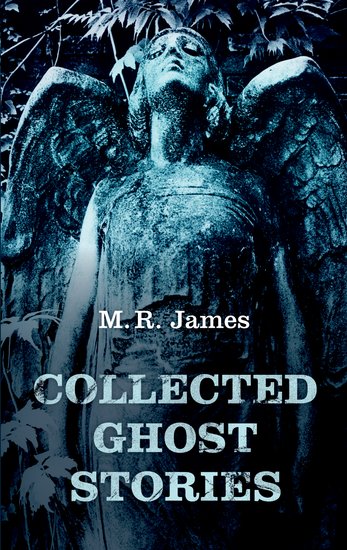Looking for a fright ? The ghost stories of M.R. James, considered by many to be the most terrifying in English, have lost none of their power to unsettle and disturb. So we’re presenting an extract from ‘Casting the Runes’ in the Collected Ghost Stories of M.R. James, edited by Darryl Ince, to get you in the mood for Halloween.
Well, the show went on, and the stories kept on becoming a little more terrifying each time, and the children were mesmerized into complete silence. At last he produced a series which represented a little boy passing through his own park — Lufford, I mean — in the evening. Every child in the room could recognize the place from the pictures. And this poor boy was followed, and at last pursued and overtaken, and either torn in pieces or somehow made away with, by a horrible hopping creature in white, which you saw first dodging about among the trees, and gradually it appeared more and more plainly. Mr. Farrer said it gave him one of the worst nightmares he ever remembered, and what it must have meant to the children doesn’t bear thinking of. Of course this was too much, and he spoke very sharply indeed to Mr. Karswell, and said it couldn’t go on. All he said was: ‘Oh, you think it’s time to bring our little show to an end and send them home to their beds? Very well!’ And then, if you please, he switched on another slide, which showed a great mass of snakes, centipedes, and disgusting creatures with wings, and somehow or other he made it seem as if they were climbing out of the picture and getting in amongst the audience; and this was accompanied by a sort of dry rustling noise which sent the children nearly mad, and of course they stampeded. A good many of them were rather hurt in getting out of the room, and I don’t suppose one of them closed an eye that night. There was the most dreadful trouble in the village afterwards. Of course the mothers threw a good part of the blame on poor Mr. Farrer, and, if they could have got past the gates, I believe the fathers would have broken every window in the Abbey. Well, now, that’s Mr. Karswell: that’s the Abbot of Luff ord, my dear, and you can imagine how we covet his society.’
‘Yes, I think he has all the possibilities of a distinguished criminal, has Karswell,’ said the host. ‘I should be sorry for anyone who got into his bad books.’
‘Is he the man, or am I mixing him up with someone else?’ asked the Secretary (who for some minutes had been wearing the frown of the man who is trying to recollect something). ‘Is he the man who brought out a History of Witchcraft some time back — ten years or more?’
‘That’s the man; do you remember the reviews of it?’
‘Certainly I do; and what’s equally to the point, I knew the author of the most incisive of the lot. So did you: you must remember John Harrington; he was at John’s in our time.’
‘Oh, very well indeed, though I don’t think I saw or heard anything of him between the time I went down and the day I read the account of the inquest on him.’
‘Inquest?’ said one of the ladies. ‘What has happened to him?’
‘Why, what happened was that he fell out of a tree and broke his neck. But the puzzle was, what could have induced him to get up there. It was a mysterious business, I must say. Here was this man — not an athletic fellow, was he? and with no eccentric twist about him that was ever noticed — walking home along a country road late in the evening — no tramps about — well known and liked in the place — and he suddenly begins to run like mad, loses his hat and stick, and finally shins up a tree — quite a difficult tree — growing in the hedgerow: a dead branch gives way, and he comes down with it and breaks his neck, and there he’s found next morning with the most dreadful face of fear on him that could be imagined. It was pretty evident, of course, that he had been chased by something, and people talked of savage dogs, and beasts escaped out of menageries; but there was nothing to be made of that. That was in ’89, and I believe his brother Henry (whom I remember as well at Cambridge, but you probably don’t) has been trying to get on the track of an explanation ever since. He, of course, insists there was malice in it, but I don’t know. It’s difficult to see how it could have come in.’
M.R. James was a brilliant linguist, palaeographer, medievalist, and biblical scholar. He edited works by Le Fanu and wrote several volumes of distinguished ghost stories. The Collected Ghost Stories of M.R. James, edited by Darryl Jones, presents all of James’s published ghost stories, including the unforgettable ‘Oh, Whistle and I’ll Come to You, My Lad’ and ‘Casting the Runes,’ plus three uncollected tales. Darryl Jones is Head of the School of English at Trinity College Dublin.
Subscribe to the OUPblog via email or RSS.
Subscribe to only literature articles on the OUPblog via email or RSS.
View more about this book on the ![]()
![]()


Here are some really scary ghost stories.
http://www.amazon.com/After-Dark-Ghost-Stories-India-ebook/dp/B00DYA0H7E/ref=sr_1_1?ie=UTF8&qid=1383238448&sr=8-1&keywords=after+dark+ghost+stories+from+india
Here are some more ghost stories you may like: http://www.amazon.com/INDIAN-GHOST-STORIES-Saptarshi-Bhattacharyya-ebook/dp/B00ON3L6JO/ref=sr_1_1?s=books&ie=UTF8&qid=1420733512&sr=1-1&keywords=indian+ghost+stories